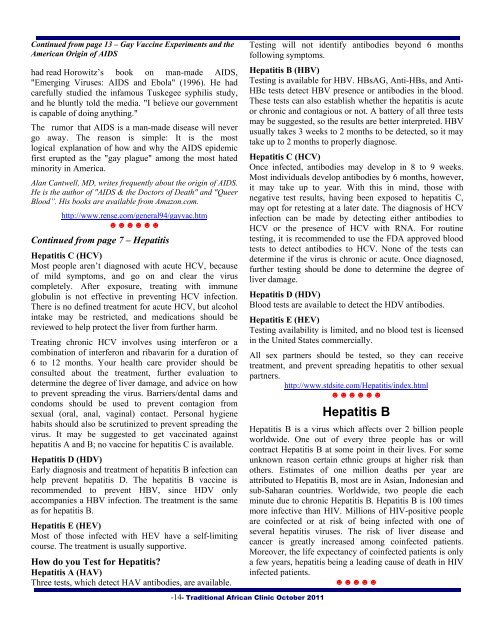African Traditional Herbal Research Clinic STD's ... - Blackherbals.com
African Traditional Herbal Research Clinic STD's ... - Blackherbals.com
African Traditional Herbal Research Clinic STD's ... - Blackherbals.com
You also want an ePaper? Increase the reach of your titles
YUMPU automatically turns print PDFs into web optimized ePapers that Google loves.
Continued from page 13 – Gay Vaccine Experiments and the<br />
American Origin of AIDS<br />
had read Horowitz’s book on man-made AIDS,<br />
"Emerging Viruses: AIDS and Ebola" (1996). He had<br />
carefully studied the infamous Tuskegee syphilis study,<br />
and he bluntly told the media. "I believe our government<br />
is capable of doing anything."<br />
The rumor that AIDS is a man-made disease will never<br />
go away. The reason is simple: It is the most<br />
logical explanation of how and why the AIDS epidemic<br />
first erupted as the "gay plague" among the most hated<br />
minority in America.<br />
Alan Cantwell, MD, writes frequently about the origin of AIDS.<br />
He is the author of "AIDS & the Doctors of Death" and "Queer<br />
Blood”. His books are available from Amazon.<strong>com</strong>.<br />
http://www.rense.<strong>com</strong>/general94/gayvac.htm<br />
☻☻☻☻☻☻<br />
Continued from page 7 – Hepatitis<br />
Hepatitis C (HCV)<br />
Most people aren’t diagnosed with acute HCV, because<br />
of mild symptoms, and go on and clear the virus<br />
<strong>com</strong>pletely. After exposure, treating with immune<br />
globulin is not effective in preventing HCV infection.<br />
There is no defined treatment for acute HCV, but alcohol<br />
intake may be restricted, and medications should be<br />
reviewed to help protect the liver from further harm.<br />
Treating chronic HCV involves using interferon or a<br />
<strong>com</strong>bination of interferon and ribavarin for a duration of<br />
6 to 12 months. Your health care provider should be<br />
consulted about the treatment, further evaluation to<br />
determine the degree of liver damage, and advice on how<br />
to prevent spreading the virus. Barriers/dental dams and<br />
condoms should be used to prevent contagion from<br />
sexual (oral, anal, vaginal) contact. Personal hygiene<br />
habits should also be scrutinized to prevent spreading the<br />
virus. It may be suggested to get vaccinated against<br />
hepatitis A and B; no vaccine for hepatitis C is available.<br />
Hepatitis D (HDV)<br />
Early diagnosis and treatment of hepatitis B infection can<br />
help prevent hepatitis D. The hepatitis B vaccine is<br />
re<strong>com</strong>mended to prevent HBV, since HDV only<br />
ac<strong>com</strong>panies a HBV infection. The treatment is the same<br />
as for hepatitis B.<br />
Hepatitis E (HEV)<br />
Most of those infected with HEV have a self-limiting<br />
course. The treatment is usually supportive.<br />
How do you Test for Hepatitis<br />
Hepatitis A (HAV)<br />
Three tests, which detect HAV antibodies, are available.<br />
Testing will not identify antibodies beyond 6 months<br />
following symptoms.<br />
Hepatitis B (HBV)<br />
Testing is available for HBV. HBsAG, Anti-HBs, and Anti-<br />
HBc tests detect HBV presence or antibodies in the blood.<br />
These tests can also establish whether the hepatitis is acute<br />
or chronic and contagious or not. A battery of all three tests<br />
may be suggested, so the results are better interpreted. HBV<br />
usually takes 3 weeks to 2 months to be detected, so it may<br />
take up to 2 months to properly diagnose.<br />
Hepatitis C (HCV)<br />
Once infected, antibodies may develop in 8 to 9 weeks.<br />
Most individuals develop antibodies by 6 months, however,<br />
it may take up to year. With this in mind, those with<br />
negative test results, having been exposed to hepatitis C,<br />
may opt for retesting at a later date. The diagnosis of HCV<br />
infection can be made by detecting either antibodies to<br />
HCV or the presence of HCV with RNA. For routine<br />
testing, it is re<strong>com</strong>mended to use the FDA approved blood<br />
tests to detect antibodies to HCV. None of the tests can<br />
determine if the virus is chronic or acute. Once diagnosed,<br />
further testing should be done to determine the degree of<br />
liver damage.<br />
Hepatitis D (HDV)<br />
Blood tests are available to detect the HDV antibodies.<br />
Hepatitis E (HEV)<br />
Testing availability is limited, and no blood test is licensed<br />
in the United States <strong>com</strong>mercially.<br />
All sex partners should be tested, so they can receive<br />
treatment, and prevent spreading hepatitis to other sexual<br />
partners.<br />
http://www.stdsite.<strong>com</strong>/Hepatitis/index.html<br />
☻☻☻☻☻☻<br />
Hepatitis B<br />
Hepatitis B is a virus which affects over 2 billion people<br />
worldwide. One out of every three people has or will<br />
contract Hepatitis B at some point in their lives. For some<br />
unknown reason certain ethnic groups at higher risk than<br />
others. Estimates of one million deaths per year are<br />
attributed to Hepatitis B, most are in Asian, Indonesian and<br />
sub-Saharan countries. Worldwide, two people die each<br />
minute due to chronic Hepatitis B. Hepatitis B is 100 times<br />
more infective than HIV. Millions of HIV-positive people<br />
are coinfected or at risk of being infected with one of<br />
several hepatitis viruses. The risk of liver disease and<br />
cancer is greatly increased among coinfected patients.<br />
Moreover, the life expectancy of coinfected patients is only<br />
a few years, hepatitis being a leading cause of death in HIV<br />
infected patients.<br />
☻☻☻☻☻<br />
-14- <strong>Traditional</strong> <strong>African</strong> <strong>Clinic</strong> October 2011
















